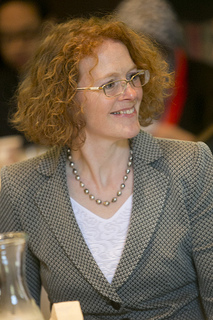
By Andrew Cohen
As the first day of orientation progressed, it sounded more and more like a Words With Friends prep session. The topic: Berkeley Law descriptors that start with the letter “c.” Be it compassion, camaraderie, collaboration, or collegiality, everyone who took the podium chose an alliterative word for what the newcomers could expect.
Professor and Acting Dean Gillian Lester emphasized community. “Berkeley Law graduates will be your partners in life and your partners in law,” she said. “You’ll form lasting friendships with classmates and faculty that will enrich your life in countless ways.”
Dean of Admissions Edward Tom stressed the importance of cooperation. Recounting a TV show in which an Italian cab driver described his secrets to success as “Go fast, be first, use your horn, and scare people,” Tom urged students to do the opposite. “Slow down,” he said. “Help each other, don’t toot your horn, and don’t worry about being first. It will help you enjoy life and live longer.”
Tom described the 285 first-year students as “a truly amazing group of people.” Collectively, the class hails from 118 colleges and a dozen countries. Their ranks include intelligence analysts from the Air Force, CIA, and FBI; a sushi chef; a musician who played in Antarctica’s only café; a patent examiner; a mime clown; a bouncer at a country and western bar; three college student presidents; and eight military members who recently returned from deployments overseas.
Professor Wayne Brazil ’75 touted the need for candor—both internally and with others. Before administering the Oath of Professionalism, Brazil described how early in his legal career he misguidedly tried to emulate his law firm’s top partner.
“Be yourself and maintain a respectful humility,” said Brazil, a former U.S. magistrate judge. “Respect for others is a cornerstone of the rule of law, and the integrity of this profession is essential to nothing less than the survival of democracy.”
A vested interest
Professor Robert Berring ’74 described the camaraderie of Berkeley Law in an insightful and at times irreverent talk about adjusting to law school life. “Students here are supportive of each other,” he said. “It’s passed down from one class to the next. It’s not like the old days of student competition or the faculty on one side and students on the other. We’re on the same team here.”
Berring’s talk drew repeated roars of laughter, especially when he explained the prescribed first-year course list in “terminology for a 5-year-old.” Contracts: “You promised!” Property: “It’s mine!” Torts: “He hit me!” Civil Procedure: “Not fair!” Criminal Law: “He took it!” Legal Writing: “Go find it yourself.”
Striking a decidedly non-hierarchical tone, Berring told the new students, “You are the law school. If you want to change something here, you have the power to do that.” He said student initiative had launched many of Berkeley Law’s top programs and organizations, and that their peers were eager to work with them.
Berring and Lester urged the students to make the most of their location—on campus and within the Bay Area. Lester noted that UC Berkeley, ranked third in the new Academic Ranking of World Universities, offers endless opportunities for recreation and relaxation.
“Take advantage of the campus,” she said. “Climb up the Campanile, watch a game in our newly renovated football stadium, attend a lecture by one of our more than 20 Nobel Laureates, see some live theatre. Take risks and stretch yourself a little beyond your comfort zone.”
The first-year class seemed eager and excited throughout the day’s events. The program included presentations by Dean of Students Annik Hirshen and Lecturer-in-Residence Lindsey Sturges Saffouri, as well as a reception in the law library. Hirshen described the many services available to the new students, and Saffouri provided an overview of the U.S. court system.
Tamila Gresham ’15 and Famid Sinha ’15, co-presidents of the Boalt Hall Student Association, reassured the class that its new environment would soon feel like home. “What truly sets this place apart is how collegial and supportive it is,” Sinha said. “Faculty, staff, students—we’re all here to help with your transition and throughout your three years here.”